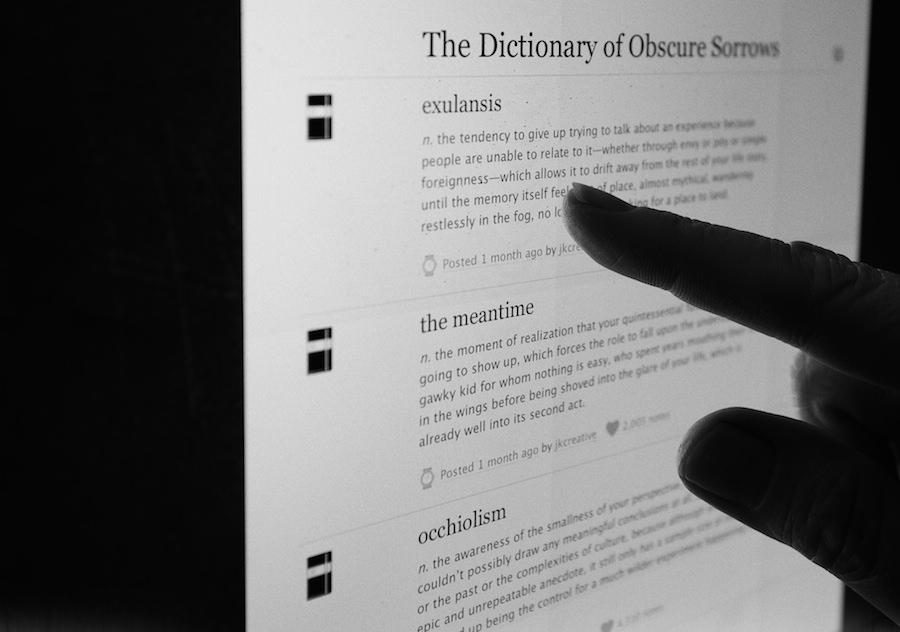The search for Obscure Sorrows
Have you ever found yourself looking for the perfect word to express an emotion, but were unable to find the right one? Like the gut-wrenching yet warm feelings of saudades, or the reassuring peace behind Insha’Allah, the power behind these expressions sometimes feels missing in the English language. For commercial director John Koenig, the angst stemming from this problem was so great that he wrote The Dictionary of Obscure Sorrows.
The Dictionary of Obscure Sorrows (TDOS) is a web project by Koenig in which previously vague feelings are named and described in English, with diction that would elicit envy in poets and lexicographers alike. His work explains the raw emotions that humans encounter in moments of vulnerability and contemplation. The feelings he writes about do not arise from others’ actions, but are instead ones that are conjured from the depths of individual experiences. Aside from the dictionary, Koenig has also created short narrated films about the words he has defined, using striking cinematography to complement his work.
With each new word entry, Koenig unearths goldmines of meaning in English, opening paths to new ways of self-expression and conveying emotions so perfectly. Here are two examples:
Onism (noun): The frustration of being stuck in just one body, that inhabits only one place at a time, which is like standing in front of the departures screen at an airport, flickering with strange place names […], each representing one more thing you’ll never get to see before you die—and all because, as the arrow on the map helpfully points out, you are here.
Sonder (noun): The realization that each random passerby is living a life as vivid and complex as your own—populated with their own ambitions, friends, routines, worries and inherited craziness— […] with elaborate passageways to thousands of other lives that you’ll never know existed, in which you might appear only once, as an extra sipping coffee in the background, as a blur of traffic passing on the highway, as a lighted window at dusk.
Onism can be felt when looking at the gorgeous landscapes on the cover of National Geographic magazine or when trading stories of past experiences with another person; sonder can be experienced when walking to Pão de Açucar and seeing that lady with the dyed scarlet hair out with her dog, noticing how she looks a bit more unkempt today—maybe it’s the way her ponytail is slightly crooked, as if walking her dog has become burdensome.
It is awe-inspiring to see how exact Koenig has been with expressing emotions. Reading his work, with all its wisdom and complexity, is like peering into experiences he has had in life. Chronologically peering through his TDOS entries is like reading a memoir of his difficulties with growing older, transitioning into middle age.
Through his work, Koenig has changed the meaning of “sorrow” for TDOS readers. Sorrow is no longer just “feeling of deep distress” (Oxford Dictionary), but according to Koenig the word is instead a feeling beyond the sense of hopelessness, amongst the myriad emotions capable of being felt. These might be emotions you do not even know exist, ones that you may never feel in your life, yet when these serendipitous moments of honest emotions arrive, they will prod your heart and remind you, “You are alive.”

In his second year in the Talon, Yoji managed to rise to the top of the Entertainment ranks, where he was once a lowly reporter. Yoji now plans to rule...

Gabriel Civita is the Image Master for The Talon after being the photographer last year. Basically, he’s still a photographer, but with a fancier title....










Shane Hardwicke • Oct 17, 2014 at 11:28 am
Thanks for making my day much more enriched by sharing this writing. I don’t think I’ll use “onism” often, but “sonder” is a perfect way to describe my 45 minute walk home on Faria Lima during the pedestrian rush hour. I feel more expressive already.